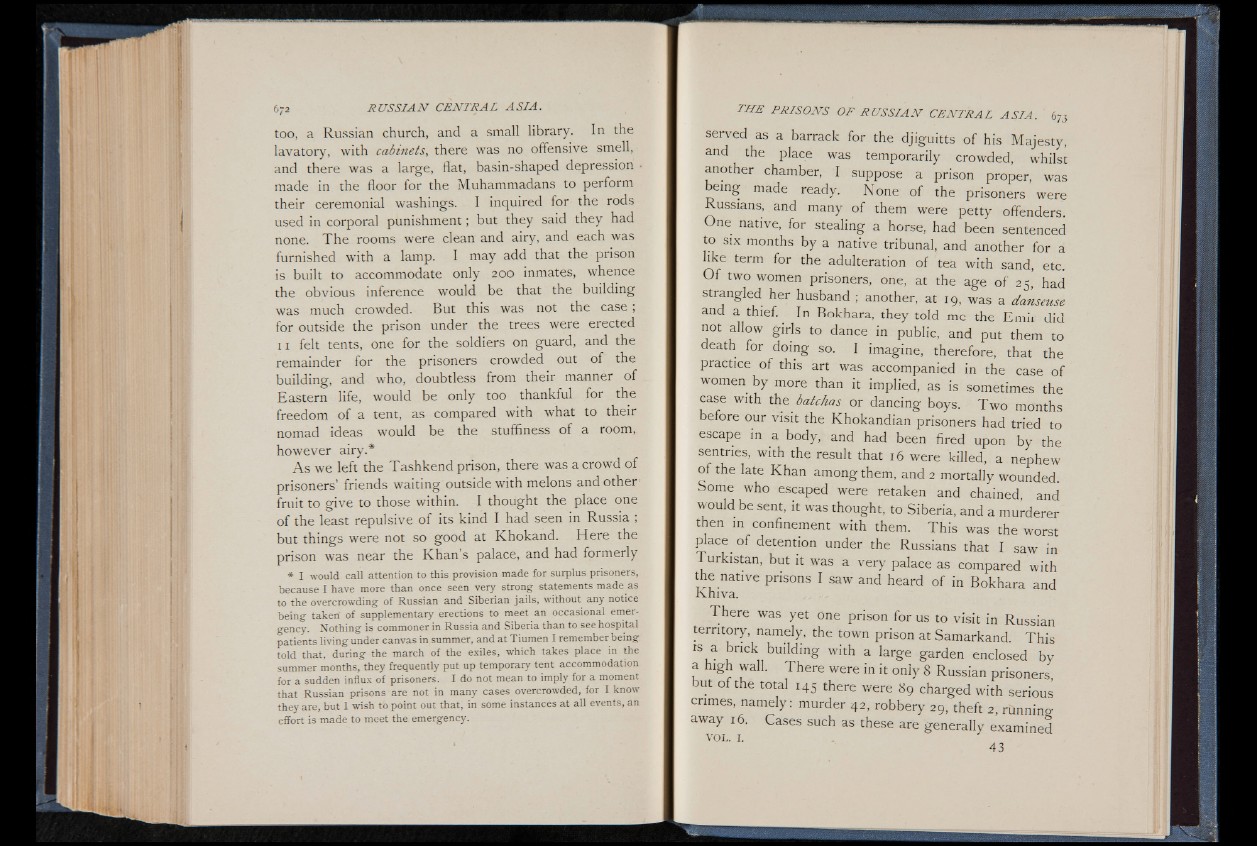
too, a Russian church, and a small library. In the
lavatory, with cabinets, there was no offensive smell,
and there was a large, flat, basin-shaped depression ■
made in the floor for the Muhammadans to perform
their ceremonial washings. I inquired for the rods
used in corporal punishment; but they said they had
none. The rooms were clean and airy, and each was
furnished with a lamp. I may add that the prison
is built to accommodate only 200 inmates, whence
the obvious inference would be that the building
was much crowded. But this was not the case ,
for outside the prison under the trees were erected
11 felt tents, one for the soldiers on guard, and the
remainder for the prisoners crowded out of the
building, and who, doubtless from their manner of
Eastern life, would be only too thankful for the
freedom of a tent, as compared with what to their
nomad ideas would be the stuffiness of a room,
however airy.*
A s we left the Tashkend prison, there was a crowd of
prisoners’ friends waiting outside with melons and other
fruit to give to those within. I thought the place one
of the least repulsive of its kind I had seen in Russia ;
but things were not so good at Khokand. Here the
prison was near the Khan’s palace, and had formerly
* 1 would call attention to this provision made for surplus prisoners,
because I have more than once seen very strong statements made as
to the overcrowding of Russian and Siberian jails, without any notice
being taken' of supplementary erections to meet an occasional emergency.
Nothing is commoner in Russia and Siberia than to see hospital
patients living under canvas in summer, and at Tiumen I remember being
told that, during the march of the exiles, which takes place in the
summer months, they frequently put up temporary tent accommodation
for a sudden influx of prisoners. I do not mean to imply for a moment
that Russian prisons are not in many cases overcrowded, for I know
they are, but 1 wish to point out that, in some instances at all events, an
effort is made to meet the emergency.
served as a barrack for the djiguitts o f his Majesty,
and the place was temporarily crowded, whilst
another chamber, I suppose a prison proper, was
emg made ready. None of the prisoners were
Russians, and many of them were petty offenders.
One native, for stealing a horse, had been sentenced
to six months by a native tribunal, and another for a
like term for the adulteration of tea with sand, etc.
O f two women prisoners, one, at the age of 25,’ had
strangled her husband ; another, at 19, was a danseuse
a a thlef- In Bokhara, they told me the Emir did
not allow girls to dance in public, and put them to
death for doing so. I imagine, therefore, that the
practice of this art was accompanied in the case of
women by more than it implied, as is sometimes the
case with the^ batchas or dancing boys. Two months
before our visit the Khokandian prisoners had tried to
escape in a body, and had been fired upon by the
sentries, with the result that 16 were killed, a nephew
of the late Khan among them, and 2 mortally wounded.
Some who escaped were retaken and chained, and
would be sent, it was thought, to Siberia, and a murderer
then in confinement with them. This was the worst
p ace of detention under the Russians that I saw in
Turkistan, but it was a very palace as compared with
the native prisons I saw and heard of in Bokhara and
Khiva.
There was yet one prison for us to visit in Russian
territory, namely, the town prison at Samarkand. This
is a brick building with a large garden enclosed by
a high wall. There were in it only 8 Russian prisoners,
but o f the total 145 there were 89 charged with serious
crimes, namely: murder 42, robbery 29, theft 2, running
away 16. Cases such as these are generally examined
VOL. I.